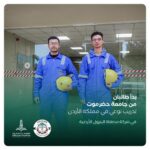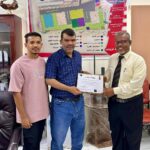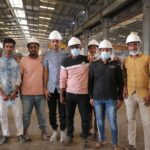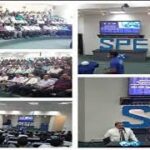Civil Engineering Department
Overview:
Civil Engineering Department was established in the academic year 2005–2006, when the faculty moved to the university campus in the university city of Fulk.
The department is distinguished by its good laboratory capabilities. The department has been equipped with laboratories containing many laboratory devices that students are trained to use to complete their scientific research and graduation projects.
The department also has a computer lab equipped with specialized design and simulation software, which students use in their fields of specialization to prepare graduates to participate fully in the modern technological era and to drive urban development.
The duration of study in the department is five academic years, after which the student is awarded a Bachelor’s degree in Civil Engineering upon successful completion of all requirements and examinations. The specialized study includes fundamental and applied courses in surveying, civil drawing, statics, dynamics, building materials, mechanics of materials, fluid mechanics, concrete technology, soil mechanics, hydrology, structural analysis, hydraulics, reinforced concrete, road and transportation engineering, foundation engineering, sanitary engineering, steel structures, building construction, specifications and quantity surveying, irrigation engineering, project management, and the restoration and rehabilitation of concrete structures.
The department emphasizes the use of specialized scientific software and integrates theoretical knowledge with practical application through field visits to ongoing construction and architectural projects to understand their functions and visit construction sites. Practical training is conducted both in the department’s laboratories and at various construction sites.
Graduates of the department are qualified to work in the design, construction, and maintenance of various engineering structures such as buildings, bridges, tanks, dams, roads, drinking water networks, irrigation and sewage systems. They are also capable of designing and managing different transportation systems, caring for various water sources, treating and reusing wastewater, finding solutions to soil problems from a structural perspective, managing engineering projects, analyzing costs, and employing various construction methods.
Mission
Vision
To achieve leadership and excellence locally and regionally in the field of civil engineering, scientific research, and community service.
Objectives
- To excel in civil engineering and other related fields.
- To equip students with critical, creative, and independent thinking skills, and the ability to work in teams, lead, and communicate effectively.
- To instill technical and ethical skills in students, with an emphasis on environmental impact, occupational safety, and community service.
- To enable graduates to successfully engage in continuous learning, implement modern technologies, and pursue professional development.
Deans of Department:
| Name | Academic Title | Period |
| Dr. Mohammed Abdullah Al-Saqqaf | Professor | 2005 – 2007 |
| Dr. Saeed Ali Bin Mazrou’ | Associate Professor | 2007-2009 |
| Dr. Mohammed Saeed Mar’i | Professor | 2009 – 2016 |
| Dr. Mishal Ahmed Sheiban | Associate Professor | 2016 – 2019 |
| Dr. Salem Khamis Bin Shamlah | Associate Professor | 2019 – 2023 |
| Dr. Saeed Omar Ahmed Al-Khail Balbeed | Assistant Professor | 2023 to present |
Faculty Members and Their Specializations:
| No. | Name | Academic Title | Notes |
| 1 | Dr. Saeed Omar Ahmed Al-Khail Balbeed | Assistant Professor | Dean of Department |
| 2 | Dr. Salem Khamis Awad Bin Shamlah | Associate Professor | |
| 3 | Dr. Mishal Ahmed Mohammed Sheiban | Associate Professor | |
| 4 | Dr. Mohammed Saeed Ahmed Mar’i | Assistant Professor | |
| 5 | Dr. Saeed Ali Mubarak Bin Mazrou’ | Assistant Professor | |
| 6 | Dr. Mohammed Hussein Abu Bakr Al-Jifri | Assistant Professor | |
| 7 | Dr. Waleed Ahmed Salem Bazar | Assistant Professor | |
| 8 | Dr. Mohammed Salem Mubarak Baneimoon | Assistant Professor | |
| 9 | Dr. Khalid Hamoud Bayaqoub | Assistant Professor | |
| 10 | Mr. Mohammed Hamza Al-Hamwi | Lecturer | |
| 11 | Mr. Muanaz Al-Sabbagh | Lecturer | |
| 12 | Mr. Salem Mohammed Ahmed Babtain | Lecturer | |
| 13 | Mr. Faraj Ali Salem Balbaith | Lecturer | |
| 14 | Abdullah Abdulkarim Aboud Basaleh | PhD | Scholarship student |
Academic Programs
مخرجات التعلم في برنامج الماجستير:
- التعرف على احتياجات المستفيدين المتنوعة وتأثير ذلك على المكان والسياق.
- القدرة على التعرف على المسؤوليات الأخلاقية والمهنية في القضايا الهندسية وإصدار أحكام مستنيرة، والتي يجب أن تأخذ في الاعتبار تأثير الحلول الهندسية في السياقات العالمية والاقتصادية والبيئية والمجتمعية.
- القدرة على تحديد وصياغة وحل المشاكل الهندسية المعقدة من خلال تطبيق مبادئ الهندسة والعلوم والرياضيات.
- استخدام المهارات والمفاهيم الأساسية في إدارة المشاريع.
- القدرة على تطوير وإجراء التجارب المناسبة وتحليل وتفسير البيانات واستخدام الحكم الهندسي لاستخلاص النتائج.
- القدرة على تطبيق التصميم الهندسي لإنتاج حلول تلبي الاحتياجات المحددة مع مراعاة الصحة العامة والسلامة والرفاهية.
- القدرة على التواصل بفعالية مع مجموعة العمل.
- القدرة على اكتساب وتطبيق المعرفة الجديدة.
وصف المقررات :
| السنة الأولى | First year | |||||||
| الفصل الدراسي الأول | First Semester | |||||||
| ت |
اسم المقرر |
الرمز | Actual
الساعات الفعلية |
Credit
الساعات المعتمدة |
Code | Course Title | ||
| t
ت |
P
ع |
T
ن |
||||||
| 1 | منهجية البحث | هنمد 600 | – | 2 | 2 | 3 | Ce 600 | Research Methodology |
| 2 | الاحتمالات والإحصاء الهندسي | هنمد 601 | – | 2 | 2 | 3 | Ce 601 | Probability and Engineering Statistics |
| 3 | إدارة التشييد | هنمد 602 | – | 2 | 2 | 3 | Ce 602 | Construction Management |
| 4 | عقود هندسة التشييد | هنمد 603 | – | 2 | 2 | 3 | Ce 603 | Construction Engineering Contracts |
| 5 | مقرر اختياري (1) | هنمد 6xx | – | 2 | 2 | 3 | Ce 6xx | Elective (1) |
| المجموع | – | 10 | 10 | 15 | SUB-TOTAL | |||
| الإجمالي | 20 | 15 | TOTAL | |||||
ن: نظري ع: عملي ت: تمارين T: theoretical P: practical t: tutorial
| السنة الأولى | First year | |||||||
| الفصل الدراسي الثاني | Second Semester | |||||||
| ت | اسم المقرر | الرمز | Actual
الساعات الفعلية |
Credit
الساعات المعتمدة |
Code | Course Title | ||
| T
ت |
P
ع |
T
ن |
||||||
| 1 | تخطيط وجدولة البناء | هنمد 604 | – | 2 | 2 | 3 | Ce 604 | Construction Planning and Scheduling |
| 2 | هندسة التشييد | هنمد 605 | – | 2 | 2 | 3 | Ce 605 | Construction Engineering |
| 3 | إدارة المخاطر في البناء | هنمد 606 | – | 2 | 2 | 3 | Ce 606 | Risk Management in Construction |
| 4 | حساب وتقدير كميات البناء | هنمد 607 | – | 2 | 2 | 3 | Ce 607 | Construction Estimation |
| 5 | مقرر اختياري (2) | هنمد 6xx | – | 2 | 2 | 3 | Ce 6xx | Elective (2) |
| المجموع | – | 10 | 10 | 15 | SUB-TOTAL | |||
| الإجمالي | 20 | 15 | TOTAL | |||||
ن: نظري ع: عملي ت: تمارين T: theoretical P: practical t: tutorial
Study Plan – Department of Civil Engineering
Bachelor’s Program in Civil Engineering
| Actual | Credit | Code | Course Title | ||
| t | P | T | |||
| 2 | 0 | 2 | 3 | CE 512 | Implementation Technology |
| 2 | 0 | 2 | 3 | CE 502 | Advanced traffic systems |
| 2 | 0 | 2 | 3 | CE 503 | Advanced steel structure design |
| 2 | 0 | 2 | 3 | CE 504 | Project management systems |
| 2 | 0 | 2 | 3 | CE 505 | Masonry building |
| 2 | 0 | 2 | 3 | CE 506 | Analysis and design of special
reinforces concrete structures |
| 2 | 0 | 2 | 3 | CE 507 | Prestressed concrete |
| 2 | 0 | 2 | 3 | CE 508 | Earthquakes engineering |
| 2 | 0 | 2 | 3 | CE 509 | Contract management and
project implementation |
| 2 | 0 | 2 | 3 | CE 5010 | Project resources |
| 2 | 0 | 2 | 3 | CE 5011 | Construction economics |
| 2 | 0 | 2 | 3 | CE 5012 | Facilities management |
| 2 | 0 | 2 | 3 | CE 5013 | Advanced Project management |
| 2 | 0 | 2 | 3 | CE 5014 | Contemporary construction
methods in buildings |
| 0 | 2 | 2 | 3 | CE 5015 | Structural Analysis Skills
With STAAD Pro& SAP& BIM Diploma |
First Year – First Semester
| Actual | Credit | Code | Course Title | ||
| t | P | T | |||
| 0 | 0 | 2 | 2 | ARAB 111 | Arabic Language I |
| 0 | 0 | 2 | 2 | ENG 112 | English Language I |
| 0 | 0 | 2 | 2 | ISLAM 113 | Islamic Culture I |
| 0 | 2 | 1 | 2 | CSC 114 | Computer Skills |
| 2 | 0 | 2 | 3 | MATH 115 | Differential Calculus |
| 0 | 2 | 2 | 3 | PHYS 116 | General Physics I |
| 2 | 0 | 2 | 3 | CE 117 | Descriptive Geometry |
| 4 | 4 | 13 | 17 | SUB-TOTAL | |
| 21 | 17 | TOTAL | |||
T: theoretical P: practical t: tutorial
First Year – Second Semester
| Actual | Credit | Code | Course Title | ||
| t | P | T | |||
| 0 | 0 | 2 | 2 | ARAB 121 | Arabic Language II |
| 0 | 0 | 2 | 2 | ENG 122 | English Language II |
| 0 | 0 | 2 | 2 | ISLAM 123 | Islamic Culture II |
| 2 | 0 | 2 | 3 | MATH 124 | Integral Calculus |
| 0 | 2 | 2 | 3 | PHYS 125 | General Physics II |
| 0 | 2 | 2 | 3 | COE 126 | Computer Programming |
| 0 | 2 | 2 | 3 | CHEM 127 | General Chemistry |
| 2 | 6 | 14 | 18 | SUB-TOTAL | |
| 22 | 18 | TOTAL | |||
T: theoretical P: practical t: tutorial
Second Year – Third Semester
| Actual | Credit | Code | Course Title | ||
| t | P | T | |||
| 0 | 2 | 2 | 3 | CE 211 | Surveying (1) |
| 2 | 0 | 2 | 3 | CE 212 | Civil Engineering Drawing |
| 2 | 0 | 2 | 3 | CE 213 | Statics |
| 0 | 2 | 2 | 3 | CE 214 | Engineering Geology |
| 0 | 0 | 2 | 2 | ENG 215 | Technical Writing |
| 2 | 0 | 2 | 3 | MATH 216 | Vectors and Matrices |
| 6 | 4 | 12 | 17 | SUB-TOTAL | |
| 22 | 17 | TOTAL | |||
T: theoretical P: practical t: tutorial
Second Year – Fourth Semester
| Actual | Credit | Code | Course Title | ||
| t | P | T | |||
| 0 | 0 | 2 | 2 | SSS 221 | Communication Skills |
| 2 | 0 | 2 | 3 | CE 222 | Materials Mechanics |
| 0 | 0 | 2 | 2 | CE 223 | Electrical and Sanitary installation |
| 0 | 2 | 2 | 3 | CE 224 | Surveying (2) |
| 0 | 2 | 2 | 3 | CE 225 | Materials of Building |
| 2 | 0 | 2 | 3 | MATH 226 | Differential Equations |
| 4 | 4 | 12 | 16 | SUB-TOTAL | |
| 20 | 16 | TOTAL | |||
T: theoretical P: practical t: tutorial
Third Year – Fifth Semester
| Actual | Credit | Code | Course Title | ||
| t | P | T | |||
| 0 | 2 | 2 | 3 | CE 311 | Concrete Technology |
| 2 | 0 | 2 | 3 | CE 312 | Structural Analysis (1) |
| 0 | 2 | 2 | 3 | CE 313 | Fluid Mechanics |
| 0 | 2 | 2 | 3 | CE 314 | Soil Mechanics (1) |
| 2 | 0 | 2 | 3 | CE 315 | Building Construction |
| 2 | 0 | 2 | 3 | MATH 316 | Engineering Probability and Statistics |
| 6 | 6 | 12 | 18 | SUB-TOTAL | |
| 24 | 18 | TOTAL | |||
T: theoretical P: practical t: tutorial
Third Year – Sixth Semester
| Actual | Credit | Code | Course Title | ||
| t | P | T | |||
| 2 | 0 | 2 | 3 | CE 321 | Reinforced Concrete (1) |
| 2 | 0 | 2 | 3 | CE 322 | Structural Analysis ( 2 ) |
| 2 | 0 | 2 | 3 | CE 323 | Hydrology |
| 0 | 2 | 2 | 3 | CE 324 | Hydraulics |
| 2 | 0 | 2 | 3 | CE 325 | Soil Mechanics (2) |
| 2 | 0 | 2 | 3 | MATH 326 | Numerical Methods |
| 10 | 2 | 12 | 18 | SUB-TOTAL | |
| 24 | 18 | TOTAL | |||
T: theoretical P: practical t: tutorial
Fourth Year – Seventh Semester
| Actual | Credit | Code | Course Title | ||
| t | P | T | |||
| 2 | 0 | 2 | 3 | CE 411 | Engineering Projects Management |
| 2 | 0 | 2 | 3 | CE 412 | Reinforced Concrete (2) |
| 2 | 0 | 2 | 3 | CE 413 | Steel Structures |
| 2 | 0 | 2 | 3 | CE 414 | Sanitary Engineering (1) |
| 0 | 2 | 2 | 3 | CE 415 | Transportation And Traffic Engineering (1) |
| 0 | 0 | 2 | 2 | GE 416 | Engineering Economy |
| 8 | 2 | 12 | 17 | SUB-TOTAL | |
| 22 | 17 | TOTAL | |||
T: theoretical P: practical t: tutorial
Fourth Year – Eighth Semester
| Actual | Credit | Code | Course Title | ||
| t | P | T | |||
| 0 | 0 | 2 | 2 | CE 421 | Principles of Scientific Research |
| 2 | 0 | 2 | 3 | CE 422 | Reinforced Concrete (3) |
| 2 | 0 | 2 | 3 | CE 423 | Sanitary Engineering (2) |
| 2 | 0 | 2 | 3 | CE 424 | Foundation Engineering |
| 2 | 0 | 2 | 3 | CE 425 | Specifications and Calculating Quantities |
| 2 | 0 | 2 | 3 | CE 426 | Transportation And Traffic Engineering (2) |
| 0 | 90 | 0 | 0 | CE 427 | Field Training |
| 10 | 0 | 12 | 17 | SUB-TOTAL | |
| 22 | 17 | TOTAL | |||
T: theoretical P: practical t: tutorial
Fifth Year – Ninth Semester
| Actual | Credit | Code | Course Title | ||
| t | P | T | |||
| 2 | 0 | 2 | 3 | CE 511 | Repair and Rehabilitation of Concrete Structures |
| 2 | 0 | 2 | 3 | CE 512 | Hydraulic Structures |
| 0 | 4 | 0 | 2 | CE 513 | Graduation Project (1) |
| X | X | 3 | 3 | CE 5XX | Elective (1) |
| X | X | 3 | 3 | CE 5XX | Elective (2) |
| 4 | 4 | 10 | 14 | SUB-TOTAL | |
| 18 | 14 | TOTAL | |||
T: theoretical P: practical t: tutorial
Fifth Year – Tenth Semester
| Actual | Credit | Code | Course Title | ||
| t | P | T | |||
| 0 | 6 | 0 | 3 | CE 521 | Graduation Project (2) |
| X | X | 3 | 3 | CE 5xx | Elective (3) |
| X | X | 3 | 3 | CE 5xx | Elective (4) |
| 0 | 6 | 6 | 9 | SUB-TOTAL | |
| 12 | 9 | TOTAL | |||
T: theoretical P: practical t: tutorial
Students :
The Department currently enrolls over 550 male and female students.
Since its establishment and up to the academic year 2023–2024, a total of 1,324 students have graduated from the department.
Table: Number of Graduates from the Department of Civil Engineering
From Establishment to the Academic Year 2023–2024
| Cohort | Academic Year | Male | Female |
| 1 | 2009-2010 | 40 | 1 |
| 2 | 2010-2011 | 63 | 0 |
| 3 | 2011-2012 | 50 | 0 |
| 4 | 2012-2013 | 106 | 0 |
| 5 | 2013-2014 | 108 | 1 |
| 6 | 2014-2015 | 144 | 0 |
| 7 | 2015-2016 | 139 | 0 |
| 8 | 2016-2017 | 60 | 0 |
| 9 | 2017-2018 | 84 | 4 |
| 10 | 2018-2019 | 79 | 0 |
| 11 | 2019-2020 | 68 | 0 |
| 12 | 2020-2021 | 87 | 0 |
| 13 | 2021-2022 | 90 | 0 |
| 14 | 2022-2023 | 86 | 0 |
| 15 | 2023-2024 | 114 | 0 |
| SUB-TOTAL | 1318 | 6 | |
| TOTAL | 1324 | ||








